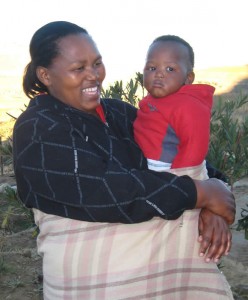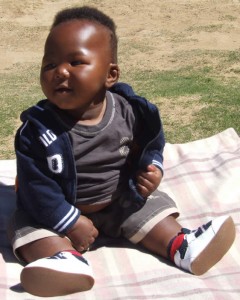In a small, rural village in Lesotho, Mamorena Namane, 30, proudly shows off her big baby boy outside her modest three-room house. With his chubby legs and broad cheeks, the baby—her second child—is a picture of health. And Mamorena knows why: she has faithfully breastfed the child since he was born.
But health didn’t come easily to her first child. At the urging of her husband’s parents, Mamorena fed the baby only water for the first week of his life until his umbilical cord fell off, a common cultural practice. Eventually she added breastmilk and soft porridge to his diet, which made the infant ill and susceptible to life-threatening infections.
It’s a common tale throughout Lesotho, where mothers frequently delay breastfeeding and nearly half of infants receive liquid and solid foods prematurely. A diet of food other than breastmilk can put babies at risk of illness, stunted growth, and death. A mother’s milk provides infants with the critical nutrients, antibodies, and fluids they need to stay healthy; international recommendations advise beginning breastfeeding in the first hour after a baby’s birth.
Through the Infant and Young Child Nutrition Project, our partners are boosting awareness among families and communities in Lesotho about healthy and safe feeding practices for young children. Because malnutrition contributes to more than a third of child deaths in poor countries, we focus on improving nutrition during the critical period from a mother’s pregnancy until her child is two years old. We train community health workers to support mothers in optimal and safe feeding practices, and mothers learn how to keep their young children healthy and well nourished.
Mamorena learned about breastfeeding’s value when, inspired by her mother, she trained as a community health worker while pregnant with her second child. The project’s training showed her how to support mothers in her community on good breastfeeding practices. She shared the information with her family, and when Mamorena and her husband welcomed their second son, her in-laws encouraged her to start breastfeeding immediately.
Now, Mamorena describes how strong and healthy her younger boy is and how her entire family has supported optimal feeding practices for her baby. She shares what she learned with people throughout her village to help other new mothers overcome cultural barriers to early and exclusive breastfeeding—and to be sure every baby has a chance to grow up healthy and strong.
Learn more about IYCN activities in Lesotho.
Photos: Aurelio Ayala III, Richard Lord, World Food Program, Josephine Nyambe, Agnes Bwalya, Christine Demmelmaier, Makatleho Masoabi, Ashely Hughes
Date: Jan 6, 2009 | Category: Success stories


